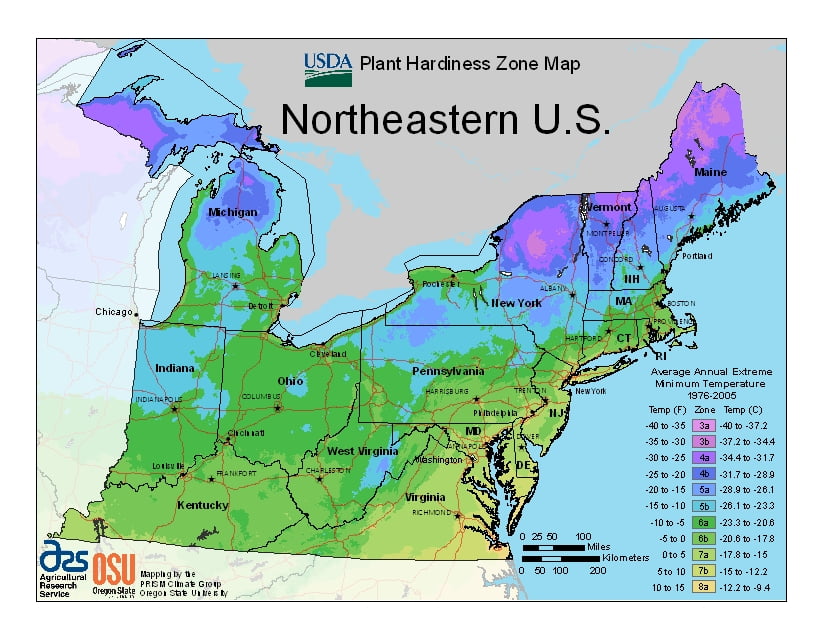
Gardening in the cooler region of Northeastern U.S., USDA Plant Hardiness Zones ranging from 3a through 8a. This region includes two of the coldest U.S. States of Michigan, and the State of Maine, to a milder climate of the East Coast State of Virginia.
The USDA zones map is a useful system for determining what plants will survive and grow in certain areas of Northeastern U.S.
Understanding how these hardiness zones work means you can choose the right planting time, and optimize growing for your climate.
States in USDA Norteastern Plant Hardiness Map
-

Connecticut
Connecticut lies at the rough transition zone between the southern end of the humid continental climate. The USDA Plant Hardiness Zone classification ranges from 5b in Rockford, to 7a near Hartford.
-

Delaware
Delaware is a part of the Atlantic coastal plain, the effects of the ocean moderate its climate. The USDA Plant Hardiness Zone classification ranges from 7a in the north of the state to 7b.
-

Indiana
Indiana had a humid continental climate, with cold winters and hot, wet summers. The USDA Plant Hardiness Zone classification ranges from 5b in the north of the state, to 6b near Indianapolis.
-

Kentucky
Kentucky has a climate that is best described as a humid subtropical climate. The USDA Plant Hardiness Zone classification ranges from 6a, to 7a near Owensboro.
-

Maine
Maine has a humid continental climate, with warm and sometimes humid summers, and long, cold and very snowy winters. The USDA Plant Hardiness Zone classification ranges from 3b in the north of the state, to 6a near Augusta.
-

Maryland
Maryland has a wide array of climates, due to local variances in elevation, and protection from colder weather due to downslope winds. The USDA Plant Hardiness Zone classification ranges from 5b to 8a near Baltimore.
-

Massachusetts
Most of Massachusetts has a humid continental climate, with cold winters and warm summers. The USDA Plant Hardiness Zone classification ranges from 5a in the north, to 7b near Boston.
-

Michigan
Michigan has a continental climate, although there are two distinct regions. The USDA Plant Hardiness Zone classification ranges from 4a, to 6b near Lansing.
-

New Hampshire
New Hampshire experiences a humid continental climate in some southern areas. The USDA Plant Hardiness Zone classification ranges from 3b in the north, to 6a near Manchester.
-

New Jersey
There are two climatic conditions in the state: a humid subtropical climate, while the northwest has a humid continental climate. The USDA Plant Hardiness Zone classification ranges from 6a near Sussex, to 7b near Newark.
-

New York
New York has a humid continental climate and New York City has a humid subtropical climate. The USDA Plant Hardiness Zone classification ranges from 3b to 7b.
-

Ohio
The climate of Ohio is a humid continental climate throughout most of the state. The USDA Plant Hardiness Zone classification ranges from 5b, to 6b near Dayton.
-

Pennsylvania
Pennsylvania’s diverse topography also produces a variety of climates, though the entire state experiences cold winters and humid summers. The USDA Plant Hardiness Zone classification ranges from 5a, to 7b near Philadelphia.
-

Vermont
Vermont has a humid continental climate, with muddy springs, in general a mild early summer. The USDA Plant Hardiness Zone classification ranges from 3b, to 5b towards the south of the state.
-

West Virginia
The climate of West Virginia is generally a humid subtropical climate with warm to hot, humid summers and chilly winters. The USDA Plant Hardiness Zone classification ranges from 5a, to 7a near Charleston.
Zones in USDA Norteastern Plant Hardiness Map
 3a (-40 to -35 °F/-40 to -37.2 °C)
3a (-40 to -35 °F/-40 to -37.2 °C) 3b (-35 to -30 °F/-37.2 to -34.4 °C)
3b (-35 to -30 °F/-37.2 to -34.4 °C) 4a (-30 to -25 °F/-34.4 to -31.7 °C)
4a (-30 to -25 °F/-34.4 to -31.7 °C) 4b (-25 to -20 °F/-31.7 to -28.9 °C)
4b (-25 to -20 °F/-31.7 to -28.9 °C) 5a (-20 to -15 °F/-28.9 to -26.1 °C)
5a (-20 to -15 °F/-28.9 to -26.1 °C) 5b (-15 to -10 °F/-26.1 to -23.3 °C)
5b (-15 to -10 °F/-26.1 to -23.3 °C) 6a (-10 to -5 °F/-23.3 to -20.6 °C)
6a (-10 to -5 °F/-23.3 to -20.6 °C) 6b (-5 to 0 °F/-20.6 to -17.8 °C)
6b (-5 to 0 °F/-20.6 to -17.8 °C) 7a (0 to 5 °F/-17.8 to -15 °C)
7a (0 to 5 °F/-17.8 to -15 °C) 7b (5 to 10 °F/-15 to -12.2 °C)
7b (5 to 10 °F/-15 to -12.2 °C) 8a (10 to 15 °F/-12.2 to -9.4 °C)
8a (10 to 15 °F/-12.2 to -9.4 °C)














